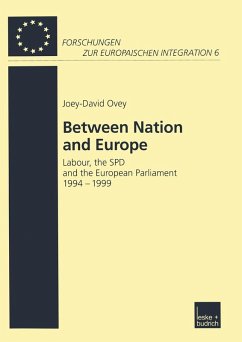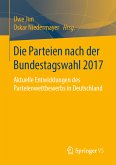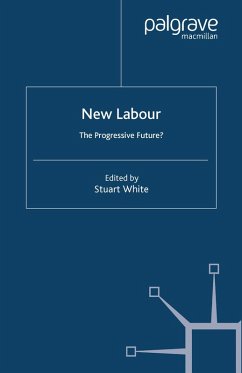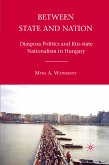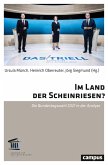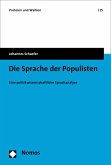Joey-David Ovey
Between Nation and Europe (eBook, PDF)
Labour, the SPD and the European Parliament 1994-1999
-23%11
40,95 €
53,49 €**
40,95 €
inkl. MwSt.
**Preis der gedruckten Ausgabe (Broschiertes Buch)
Sofort per Download lieferbar

20 °P sammeln
-23%11
40,95 €
53,49 €**
40,95 €
inkl. MwSt.
**Preis der gedruckten Ausgabe (Broschiertes Buch)
Sofort per Download lieferbar
Alle Infos zum eBook verschenken

20 °P sammeln
Als Download kaufen

53,49 €****
-23%11
40,95 €
inkl. MwSt.
**Preis der gedruckten Ausgabe (Broschiertes Buch)
Sofort per Download lieferbar

20 °P sammeln
Jetzt verschenken
Alle Infos zum eBook verschenken
53,49 €****
-23%11
40,95 €
inkl. MwSt.
**Preis der gedruckten Ausgabe (Broschiertes Buch)
Sofort per Download lieferbar
Alle Infos zum eBook verschenken

20 °P sammeln
Joey-David Ovey
Between Nation and Europe (eBook, PDF)
Labour, the SPD and the European Parliament 1994-1999
- Format: PDF
- Merkliste
- Auf die Merkliste
- Bewerten Bewerten
- Teilen
- Produkt teilen
- Produkterinnerung
- Produkterinnerung

Bitte loggen Sie sich zunächst in Ihr Kundenkonto ein oder registrieren Sie sich bei
bücher.de, um das eBook-Abo tolino select nutzen zu können.
Hier können Sie sich einloggen
Hier können Sie sich einloggen
Sie sind bereits eingeloggt. Klicken Sie auf 2. tolino select Abo, um fortzufahren.

Bitte loggen Sie sich zunächst in Ihr Kundenkonto ein oder registrieren Sie sich bei bücher.de, um das eBook-Abo tolino select nutzen zu können.
The book compares how the SPD and the Labour Party managed relations with MEPs from 1994 to 1999. It shows the link between polity and party organisation and how behaviour within the state is transferred to the European Parliament. "Europeanisation" is shown to entail more than policy choices; organisation matters.
- Geräte: PC
- ohne Kopierschutz
- eBook Hilfe
- Größe: 22.89MB
Andere Kunden interessierten sich auch für
- -22%11
![Die Parteien nach der Bundestagswahl 2017 (eBook, PDF) Die Parteien nach der Bundestagswahl 2017 (eBook, PDF)]() Die Parteien nach der Bundestagswahl 2017 (eBook, PDF)46,99 €
Die Parteien nach der Bundestagswahl 2017 (eBook, PDF)46,99 € ![New Labour (eBook, PDF) New Labour (eBook, PDF)]() New Labour (eBook, PDF)73,95 €
New Labour (eBook, PDF)73,95 €![Between State and Nation (eBook, PDF) Between State and Nation (eBook, PDF)]() M. WaterburyBetween State and Nation (eBook, PDF)73,95 €
M. WaterburyBetween State and Nation (eBook, PDF)73,95 €![Austerity Politics and UK Economic Policy (eBook, PDF) Austerity Politics and UK Economic Policy (eBook, PDF)]() Craig BerryAusterity Politics and UK Economic Policy (eBook, PDF)40,95 €
Craig BerryAusterity Politics and UK Economic Policy (eBook, PDF)40,95 €![Neoliberal Industrial Relations Policy in the UK (eBook, PDF) Neoliberal Industrial Relations Policy in the UK (eBook, PDF)]() C. CraddenNeoliberal Industrial Relations Policy in the UK (eBook, PDF)40,95 €
C. CraddenNeoliberal Industrial Relations Policy in the UK (eBook, PDF)40,95 €![Im Land der Scheinriesen? (eBook, PDF) Im Land der Scheinriesen? (eBook, PDF)]() Im Land der Scheinriesen? (eBook, PDF)36,99 €
Im Land der Scheinriesen? (eBook, PDF)36,99 €![Die Sprache der Populisten (eBook, PDF) Die Sprache der Populisten (eBook, PDF)]() Johannes SchaeferDie Sprache der Populisten (eBook, PDF)42,00 €
Johannes SchaeferDie Sprache der Populisten (eBook, PDF)42,00 €-
- -17%11
-
The book compares how the SPD and the Labour Party managed relations with MEPs from 1994 to 1999. It shows the link between polity and party organisation and how behaviour within the state is transferred to the European Parliament. "Europeanisation" is shown to entail more than policy choices; organisation matters.
Dieser Download kann aus rechtlichen Gründen nur mit Rechnungsadresse in A, B, BG, CY, CZ, D, DK, EW, E, FIN, F, GR, HR, H, IRL, I, LT, L, LR, M, NL, PL, P, R, S, SLO, SK ausgeliefert werden.
Produktdetails
- Produktdetails
- Verlag: VS Verlag für Sozialwissenschaften
- Seitenzahl: 227
- Erscheinungstermin: 6. Dezember 2012
- Englisch
- ISBN-13: 9783322933362
- Artikelnr.: 53199969
- Verlag: VS Verlag für Sozialwissenschaften
- Seitenzahl: 227
- Erscheinungstermin: 6. Dezember 2012
- Englisch
- ISBN-13: 9783322933362
- Artikelnr.: 53199969
- Herstellerkennzeichnung Die Herstellerinformationen sind derzeit nicht verfügbar.
Dr. rer. pol. Joey-David Ovey, Fachbereich Sozialwissenschaften, Universität Osnabrück.
1. Parties at the European Level and Research Question.- 1.1 The question of parties at the European level.- 1.2 Transnational parties in the EU.- 1.3 Research interest and question.- 1.4 Research design and method.- 2. Theoretical Background.- 2.1 New institutionalism.- 2.2 Parties as institutions and party change.- 2.3 Hypothesising about detachment and national party reactions.- 2.4 Conclusion.- 3. Setting the Scene: The European Parliament.- 3.1 The EP in the political system of the EU.- 3.1.1 The EP from the founding of the ECSC via the Treaties of Rome to the first direct elections.- 3.1.2 The EP from the first direct elections to the Single European Act.- 3.1.3 From the SEA to Maastricht.- 3.1.4 From Maastricht to Amsterdam.- 3.1.5 The EP post-Amsterdam.- 3.2 The EP as an institutional setting for party work.- 3.3 The EP a new sort of parliament?.- 4. The Group of the Party of European Socialists.- 4.1 History and development.- 4.1.1 History until the founding of the ECSC.- 4.1.2 From the founding of the ECSC to the Hague Summit.- 4.1.3 From the Hague Summit to the first direct elections.- 4.1.4 From the first direct elections to the SEA.- 4.1.5 From the SEA to Maastricht.- 4.1.6 From Maastricht to the present.- 4.2 Organisational make-up.- 4.3 The Group of the PES a detached entity.- 5. The SPD.- 5.1 The SPD organisation and anarchy .- 5.1.1 Panebianco s thoughts on the SPD.- 5.1.2 Is Panebianco right?.- 5.1.3 Expectations of the SPD in the EP.- 5.2 Relations between the SPD leadership and the SPD delegation.- 5.2.1 The European election 1994.- 5.2.2 The 1994 Bundestag election.- 5.2.3 The chancellor candidate question.- 5.2.4 The 1998 Bundestag election.- 5.2.4.1 Links between the SPD delegation in the EP and the Bundestag SPD group.- 5.2.5 Into government: the problem of multi-level co-ordination and hierarchy.- 5.2.6 The 1999 German presidency of the Council of Ministers.- 5.2.7 Policy-making in the SPD delegation.- 5.2.7.1 Economic and Monetary Union.- 5.2.7.2 Regional aid.- 5.2.7.3 Relations with Turkey.- 5.2.7.4 Institutional affairs.- 5.2.7.5 The 1996 discharge and the vote of confidence in the Commission.- 5.2.8 The 1999 European election.- 5.2.8.1 The selection procedure.- 5.2.8.2 The election.- 5.3 SPD in the group of the PES a summary.- 6. The Labour Party.- 6.1 The Labour Party organisation and change.- 6.1.1 Panebianco s thoughts on Labour.- 6.1.2 Towards a greater degree of institutionalisation?.- 6.1.3 Expectations of Labour in the EP.- 6.2 Relations between the Labour leadership and the EPLP.- 6.2.1 The 1994 European election.- 6.2.2 The EPLP and the election of Tony Blair as party leader.- 6.2.3 The EPLP and Clause 4.- 6.2.4 The 1997 general election.- 6.2.4.1 Links between the EPLP and the PLP.- 6.2.5 The introduction of the link system .- 6.2.6 The code of conduct.- 6.2.7 The 1998 British Presidency of the Council of Ministers.- 6.2.8 Policy-making in the EPLP.- 6.2.8.1 Economic and Monetary Union.- 6.2.8.2 Agriculture and Agenda 2000: modulation.- 6.2.8.3 Issues relating to the internal market: workers rights.- 6.2.8.4 Relations with Turkey.- 6.2.8.5 Institutional affairs.- 6.2.8.6 The 1996 discharge and the vote of confidence in the Commission.- 6.2.9 The 1999 European election.- 6.2.9.1 The selection procedure.- 6.2.9.2 The election.- 6.3 Labour in the group of the PES a summary.- 7. Conclusions Lessons for European Parties.- 7.1 The SPD and Labour in the group of the PES in the EP a comparison.- 7.2 Suggestions for improvement.- 7.2.1 SPD.- 7.2.2 Labour.- 7.3 Is detachment legitimate?.- 7.4 Lessons for EU parties and the EU party system.
1. Parties at the European Level and Research Question.- 1.1 The question of parties at the European level.- 1.2 Transnational parties in the EU.- 1.3 Research interest and question.- 1.4 Research design and method.- 2. Theoretical Background.- 2.1 New institutionalism.- 2.2 Parties as institutions and party change.- 2.3 Hypothesising about detachment and national party reactions.- 2.4 Conclusion.- 3. Setting the Scene: The European Parliament.- 3.1 The EP in the political system of the EU.- 3.1.1 The EP from the founding of the ECSC via the Treaties of Rome to the first direct elections.- 3.1.2 The EP from the first direct elections to the Single European Act.- 3.1.3 From the SEA to Maastricht.- 3.1.4 From Maastricht to Amsterdam.- 3.1.5 The EP post-Amsterdam.- 3.2 The EP as an institutional setting for party work.- 3.3 The EP a new sort of parliament?.- 4. The Group of the Party of European Socialists.- 4.1 History and development.- 4.1.1 History until the founding of the ECSC.- 4.1.2 From the founding of the ECSC to the Hague Summit.- 4.1.3 From the Hague Summit to the first direct elections.- 4.1.4 From the first direct elections to the SEA.- 4.1.5 From the SEA to Maastricht.- 4.1.6 From Maastricht to the present.- 4.2 Organisational make-up.- 4.3 The Group of the PES a detached entity.- 5. The SPD.- 5.1 The SPD organisation and anarchy .- 5.1.1 Panebianco s thoughts on the SPD.- 5.1.2 Is Panebianco right?.- 5.1.3 Expectations of the SPD in the EP.- 5.2 Relations between the SPD leadership and the SPD delegation.- 5.2.1 The European election 1994.- 5.2.2 The 1994 Bundestag election.- 5.2.3 The chancellor candidate question.- 5.2.4 The 1998 Bundestag election.- 5.2.4.1 Links between the SPD delegation in the EP and the Bundestag SPD group.- 5.2.5 Into government: the problem of multi-level co-ordination and hierarchy.- 5.2.6 The 1999 German presidency of the Council of Ministers.- 5.2.7 Policy-making in the SPD delegation.- 5.2.7.1 Economic and Monetary Union.- 5.2.7.2 Regional aid.- 5.2.7.3 Relations with Turkey.- 5.2.7.4 Institutional affairs.- 5.2.7.5 The 1996 discharge and the vote of confidence in the Commission.- 5.2.8 The 1999 European election.- 5.2.8.1 The selection procedure.- 5.2.8.2 The election.- 5.3 SPD in the group of the PES a summary.- 6. The Labour Party.- 6.1 The Labour Party organisation and change.- 6.1.1 Panebianco s thoughts on Labour.- 6.1.2 Towards a greater degree of institutionalisation?.- 6.1.3 Expectations of Labour in the EP.- 6.2 Relations between the Labour leadership and the EPLP.- 6.2.1 The 1994 European election.- 6.2.2 The EPLP and the election of Tony Blair as party leader.- 6.2.3 The EPLP and Clause 4.- 6.2.4 The 1997 general election.- 6.2.4.1 Links between the EPLP and the PLP.- 6.2.5 The introduction of the link system .- 6.2.6 The code of conduct.- 6.2.7 The 1998 British Presidency of the Council of Ministers.- 6.2.8 Policy-making in the EPLP.- 6.2.8.1 Economic and Monetary Union.- 6.2.8.2 Agriculture and Agenda 2000: modulation.- 6.2.8.3 Issues relating to the internal market: workers rights.- 6.2.8.4 Relations with Turkey.- 6.2.8.5 Institutional affairs.- 6.2.8.6 The 1996 discharge and the vote of confidence in the Commission.- 6.2.9 The 1999 European election.- 6.2.9.1 The selection procedure.- 6.2.9.2 The election.- 6.3 Labour in the group of the PES a summary.- 7. Conclusions Lessons for European Parties.- 7.1 The SPD and Labour in the group of the PES in the EP a comparison.- 7.2 Suggestions for improvement.- 7.2.1 SPD.- 7.2.2 Labour.- 7.3 Is detachment legitimate?.- 7.4 Lessons for EU parties and the EU party system.
